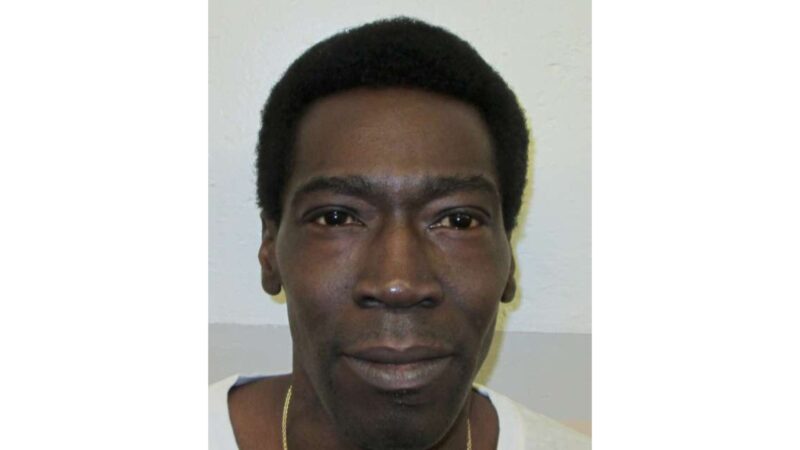Alabama executes man with nitrogen gas for 1993 murder over $200 drug debt
ATMORE, Ala. (AP) — An Alabama man convicted of helping to burn a man alive in 1993 over a $200 drug debt was executed by nitrogen gas on Thursday.
Anthony Boyd, 54, was pronounced dead at 6:33 p.m. at William C. Holman Correctional Facility, authorities said. The execution was carried out by nitrogen gas, a method Alabama began using last year.
Boyd was sentenced to death for his role in killing Gregory Huguley in Talladega County. Prosecutors said Huguley was set on fire after he didn’t pay for $200 worth of cocaine.
Boyd used his final words to proclaim his innocence and criticize the criminal justice system.
“I didn’t kill anybody. I didn’t participate in killing anybody,” he said. “There can be no justice until we change this system,” he continued, before closing with, “Let’s get it.”
The execution appeared to take longer than prior nitrogen gas executions. The state does not reveal the exact time the gas began flowing.
At about 5:57 p.m. Boyd clenched his fist, raised his head off the gurney slightly and began shaking. He then raised his legs off the the gurney several inches. At about 6:01 p.m. those movements stopped, and he began a series of heaving breaths that lasted at least 15 minutes, before becoming still.
A prosecution witness at Boyd’s trial testified as part of a plea agreement and said that Boyd taped Huguley’s feet together before another man doused him in gasoline and set him on fire. Defense lawyers said he was at a party on the night Huguley was killed.
A jury convicted Boyd of capital murder during a kidnapping and recommended by a vote of 10-2 that he receive a death sentence.
Alabama Attorney General Steve Marshall said in a statement that the state “remains steadfast in its commitment to uphold the law and deliver justice for victims and their families.”
“For more than 30 years, Boyd sought to delay justice through endless litigation, yet he never once presented evidence that the jury was wrong,” Marshall said.
Boyd had been on Alabama’s death row since 1995. He was the latest chair of Project Hope to Abolish the Death Penalty, an anti-death penalty group founded by men on death row.
Alabama began using nitrogen gas last year to carry out some executions. The method uses a gas mask strapped over the inmate’s face to replace breathable air with pure nitrogen gas, causing the person to die from lack of oxygen.
Nationally, the method has now been used in eight executions: seven times in Alabama and once in Louisiana.
The state and Boyd’s spiritual adviser gave conflicting accounts of what happened in the execution chamber.
Alabama Corrections Commissioner John Hamm said he believed Boyd’s shaking was involuntary, and he said while the execution took longer than previous ones, it was “just a few minutes past some of the others.”
The Rev. Jeff Hood stood by Boyd as he died. He was also at the first nitrogen gas execution.
“This is the worst one yet,” Hood said. “I think they are absolutely incompetent when it comes to carrying out these executions.”
Hood said he believed Boyd had “some level of consciousness, in my opinion, for at least 16 minutes.” Hamm disputed that assessment.
Boyd’s lawyers had asked a federal judge to halt the execution to give the method more scrutiny. A federal judge declined the request. She ruled Boyd was unlikely to prevail on claims that the method is unconstitutionally cruel.
The U.S. Supreme Court on Thursday afternoon also denied Boyd’s request to stay the execution and to instead let him die by firing squad. Justice Sonia Sotomayor authored a scathing dissent joined by Justices Elena Kagan and Ketanji Brown Jackson.
Sotomayor, citing witness descriptions of past nitrogen gas executions, wrote that there is “mounting and unbroken evidence” that the method is unconstitutional. She wrote that “allowing the nitrogen hypoxia experiment to continue” fails to protect the dignity of the nation.
Alabama has maintained that any shaking or gasping exhibited by inmates during nitrogen gas executions are largely involuntary actions caused by oxygen deprivation.
HUD proposes time limits and work requirements for rental aid
The rule would allow housing agencies and landlords to impose such requirements "to encourage self-sufficiency." Critics say most who can work already do, but their wages are low.
Paramount and Warner Bros’ deal is about merging studios, and a whole lot more
The nearly $111 billion marriage would unite Paramount and Warner film studios, streamers and television properties — including CNN — under the control of the wealthy Ellison family.
A new film follows Paul McCartney’s 2nd act after The Beatles’ breakup
While previous documentaries captured the frenzy of Beatlemania, Man on the Run focuses on McCartney in the years between the band's breakup and John Lennon's death.
An aspiring dancer. A wealthy benefactor. And ‘Dreams’ turned to nightmare
A new psychological drama from Mexican filmmaker Michel Franco centers on the torrid affair between a wealthy San Francisco philanthropist and an undocumented immigrant who aspires to be a dancer.
Bill making the Public Service Commission an appointed board is dead for the session
Usually when discussing legislative action, the focus is on what's moving forward. But plenty of bills in a legislature stall or even die. Leaders in the Alabama legislature say a bill involving the Public Service Commission is dead for the session. We get details on that from Todd Stacy, host of Capitol Journal on Alabama Public Television.
My doctor keeps focusing on my weight. What other health metrics matter more?
Our Real Talk with a Doc columnist explains how to push back if your doctor's obsessed with weight loss. And what other health metrics matter more instead.







